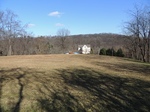Our Honeybee Adventure
Our First Year
By Paul Martin, Pittsburgh, PA
You can navigate to the other pages by using the above tabs in the title: The Beginning Beekeeper, Photos, etc. This site is going to be under constant construction. You should also be able to click on a picture to see a larger version.
All photos shown on these pages were taken by my wife Ruth. Without her there would be no pictures at all. Thanks Ruth!
If you wish to send a comment or question, email: (copy & paste the below email address only.)
paulemar21@verizon.net
Starting
After considering keeping bees for 15 years, my wife Ruth and I finally decided to make the commitment. As of today, 5/17/2014, we have had our bees 1 month. These pages will hopefully document our successes, failures, problems, and progress as we continue on this journey. We have a wonderful local bee club that we have joined, BurghBees. (see link below) We hope to give an insight to beginning beekeeping to anyone who is thinking about starting this as a hobby. This site is going to be following our particular experiences. We hope that you will find some of this information useful.
Our Setting
We are very fortunate as we have purchased (8/16) an additional 6.44 acres adjacent to our original 1.81 acres located within 5 minutes of downtown Pittsburgh. Our property is also fairly isolated being surrounded by acres of woods and fields. Others who may be interested in beekeeping may not be so lucky, however, there are many urban beekeepers that have a couple of hives on very small lots. BurghBees is a community apiary located within the city of Pittsburgh. Visit the link for a really interesting perspective on urban beekeeping.
Once we decided to do this, we asked each other the question; "Where do we start?" We started by seriously studying about bees for over a year. Reading, using the internet, studying bee supply company catalogs, all gave us valuable information. What convinced us that we could do this was attending a local beginners beekeeping workshop. Lots of friendly people with a common interest attended. The workshop provided a generous packet filled with beekeeping catalogs, a how to get started booklet, and most importantly, information on where to get bees locally. (available early in season only) The presentations were made by experienced, local, beekeepers, who during the one-day class gave all the information required to get started. Advanced courses are also available for beginners who have had bees beyond the first year. We will take those this coming winter. You should definitely take a workshop course if available. There is usually a cost for these courses. Our particular one was $50 for an individual and $80 for individual and guest. There was a single info packet supplied per individual and guest combo.
Buying Equipment
The first consideration is where are you going to put your hives? It is highly recommended that you start with 2 hives as that gives you the ability to compare. With a single hive, as a beginner you may not know there is something not quite right if there is a problem with one hive. So, make sure that you have room.
We installed our hives on a stand made from cement blocks, 2 X 4's, and welded wire. This keeps the hives above the ground and lessens the likelihood of several possible problems. They are on an open Eastern exposure in full sun. It is located on a flat spot about 20 ft. down and away from our driveway. So far all of this was made from materials we already had around.
We knew that we wanted 2 hives and found a couple of online "big name" suppliers that had free shipping with minimum purchase. I kind of ordered quite a bit more than needed for the first year so you can get by with significantly less than we did to start. You can buy starter kits for less than $100 each not including the wax foundation, which you will need to buy. Keep in mind that you will need to expand each hive upward within 4-6 weeks of bee installation so you should probably purchase those boxes, frames and foundation at the same time as your initial order. All of this requires you to study in order to know what you will need and what you won't need right away. Also remember that bee and equipment suppliers become very busy and shipping delays are the norm as the Southern states gear up for the spring season. So, order early! Bees can easily be sold out for the season. For here in Pittsburgh, I ordered our hives, jackets, tools, etc. in mid February. I ordered bees a week later for late April delivery. Some of the equipment arrived in 10 days, but the hives took 3 weeks. The bees arrived on time for local pick-up and this supplier was sold out weeks before.
New potential Pittsburgh area beekeepers should check out the introductory classes at the BurghBees website mentioned above. Remember that BurghBees is a non profit organization and that the excellent instructors at the workshops volunteer their time.
